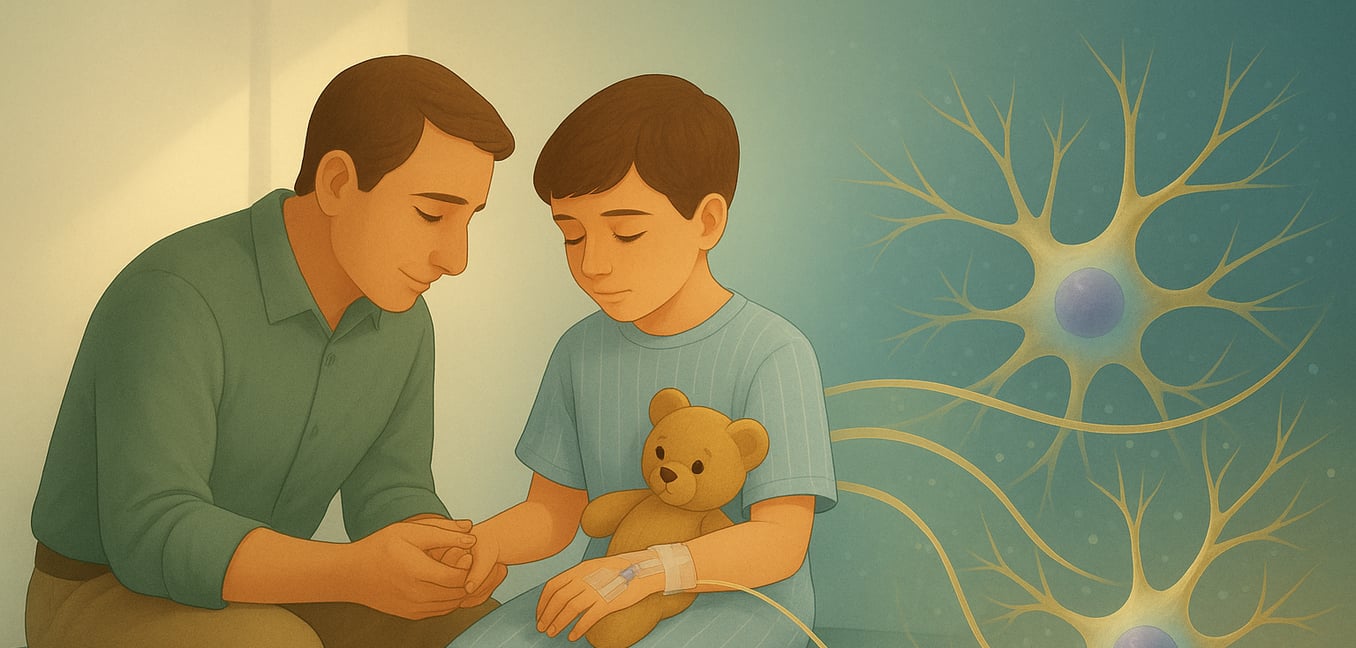A Difficult Diagnosis
Receiving a neuroblastoma diagnosis is a deeply challenging moment that begins a complex journey for a child and their family. The path to diagnosis involves multiple steps, including blood tests, imaging scans like CTs or MRIs, and a biopsy to confirm the cancer. Doctors then perform staging tests to understand if the disease has spread.
This intense and often rapid process can be overwhelming. Because of this, integrated psychological support for the entire family is not just an add-on; it is a critical part of comprehensive cancer care from the very first day.
Supporting the Young Patient: Psychological Care for Children
A neuroblastoma diagnosis affects a child’s entire world, not just their physical health. Addressing their emotional and psychological needs is a fundamental part of their care, helping them build resilience and cope with the challenges of treatment.
Use Honest, Age-Appropriate Communication
It is vital to talk to children about their illness in a way they can understand. This builds trust and reduces fear of the unknown. Use simple, clear language and avoid overly complex medical terms. Reassuring them that the illness is not their fault is a critical message to repeat. Creating a safe space where they feel comfortable asking any question empowers them to process what is happening.
Maintain a Sense of Normalcy and Routine
The structure of daily life provides a powerful sense of security for a child amidst the chaos of hospital visits. Whenever possible, stick to familiar routines like regular mealtimes and bedtimes to offer comfort. Continuing with schoolwork, with help from a hospital tutor, and setting aside time for play helps the child feel like more than just a patient.
Encourage Creative and Therapeutic Play
Play is a child's natural language and an effective tool for processing complex emotions. Through activities like drawing or storytelling, children can express feelings they may not have the words for. Medical play, using dolls or toy medical kits, allows them to act out procedures they will undergo, which can demystify the experience and give them a sense of control.
Access Professional Support
Your care team includes experts trained to support your child’s emotional well-being. Child life specialists use play and education to help children understand and cope with their medical journey. They prepare children for procedures and provide distractions during them. Pediatric psychologists offer more structured support, teaching coping strategies and helping manage anxiety or sadness.
Caring for the Caregivers: Essential Support for Parents
When a child is diagnosed with neuroblastoma, the focus naturally shifts to their needs. However, parental well-being is a vital part of the support system. Taking care of yourself is a necessity that allows you to provide the best possible care for your child.
Build Your Support Network
Friends and family often want to assist but may not know how. Be specific with your requests. Instead of a general "we're fine," try asking for practical support like preparing a meal or taking other children to an activity. Delegating these responsibilities frees up your energy to focus on your child and your own emotional recovery.
Prioritize Small Acts of Self-Care
Finding moments for yourself might seem impossible, but brief breaks help prevent burnout. This can be as simple as taking a 15-minute walk, listening to a podcast, or practicing deep breathing exercises. These brief interludes provide a necessary mental reset, helping to reduce stress and maintain the resilience needed for the long road ahead.
Seek Professional Guidance
It is essential to recognize that parents are also going through a significant emotional experience. Hospital social workers are experts in connecting you with practical resources, from financial aid to lodging. They can also provide counseling and help you manage stress. Joining a support group or seeking individual therapy provides a confidential space to process grief, anxiety, and fear.
Remembering the Siblings: Addressing Their Needs
When a child is diagnosed with cancer, their siblings navigate their own quiet emotional journey. Recognizing and addressing their needs is crucial for the well-being of the entire family.
Maintain Open Communication
Explain the illness in simple, honest terms a sibling can understand. Reassure them that cancer is not contagious and that nothing they did or thought caused their sibling to get sick. Answering their questions openly helps demystify the situation, reduces anxiety, and builds trust.
Carve Out Dedicated Time
Set aside protected one-on-one time with each sibling. This powerful gesture reaffirms they are seen and cherished amidst the chaos. A short walk, a game, or reading a book together sends a powerful message. If time is short, enlist trusted relatives or friends for fun outings.
Validate Their Complex Emotions
Acknowledge that it is normal for siblings to feel a mix of fear, jealousy, anger, or guilt. Instead of dismissing their feelings, validate them by saying, "I know it feels unfair that we had to cancel your playdate." This helps them feel understood and gives them permission to work through their complicated feelings in a healthy way.
Your Integrated Healthcare Support System
Navigating a neuroblastoma diagnosis is not something you do alone. Your hospital's healthcare team provides a comprehensive safety net designed to support your entire family's well-being, working together to ease the burdens of treatment.
This team is a network of interconnected professionals. Child life specialists focus on your child's developmental needs, using therapeutic play to reduce anxiety and make the hospital less intimidating. They work closely with pediatric psychologists, who provide talk therapy and coping strategies for the patient, parents, and siblings alike.
Hospital social workers act as your family's primary navigators. They are experts in coordinating practical resources like financial assistance, lodging, and school liaisons, which allows you to focus more of your energy on your family's emotional health.
The palliative care team provides another essential layer of support. Focused on maximizing comfort and quality of life from the moment of diagnosis, they specialize in managing symptoms like pain and nausea. Working alongside the oncology team, they help ensure the best possible quality of life for your child throughout their treatment journey.










